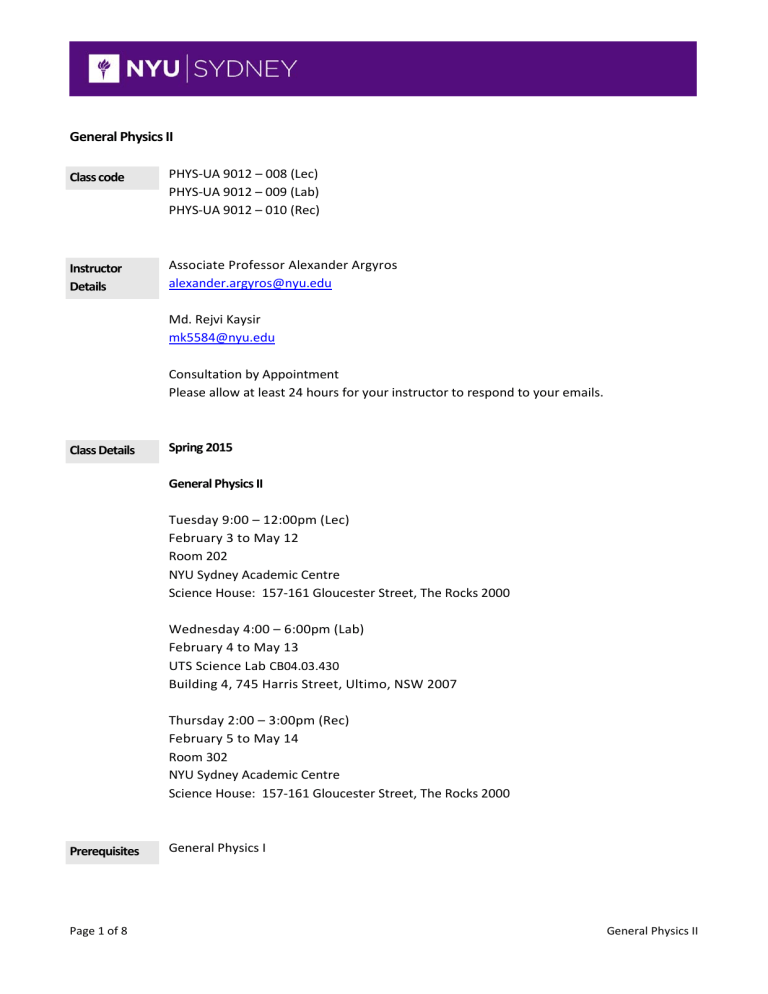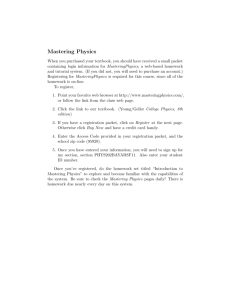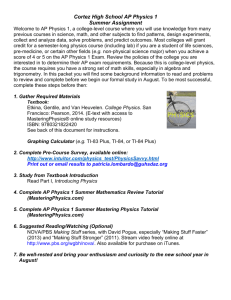General Physics II - New York University

General Physics II
Class code
PHYS-UA 9012 – 008 (Lec)
Instructor
Details
PHYS-UA 9012 – 009 (Lab)
PHYS-UA 9012 – 010 (Rec)
Associate Professor Alexander Argyros alexander.argyros@nyu.edu
Md. Rejvi Kaysir mk5584@nyu.edu
Consultation by Appointment
Please allow at least 24 hours for your instructor to respond to your emails.
Class Details
Prerequisites
Spring 2015
General Physics II
Tuesday 9:00 – 12:00pm (Lec)
February 3 to May 12
Room 202
NYU Sydney Academic Centre
Science House: 157-161 Gloucester Street, The Rocks 2000
Wednesday 4:00 – 6:00pm (Lab)
February 4 to May 13
UTS Science Lab CB04.03.430
Building 4, 745 Harris Street, Ultimo, NSW 2007
Thursday 2:00 – 3:00pm (Rec)
February 5 to May 14
Room 302
NYU Sydney Academic Centre
Science House: 157-161 Gloucester Street, The Rocks 2000
General Physics I
Page 1 of 8 General Physics II
Class
Description
Desired
Outcomes
Assessment
Components
Page 2 of 8
This course is an introduction to electricity and magnetism, light, geometrical and wave optics. Many concepts from General Physics I will be used in this course such as: position, velocity, acceleration, force, Newton’s laws of motion, work and energy. The course uses high school algebra, geometry and trigonometry, vectors and vector arithmetic, and some calculus. Calculus will be used in class but sparingly on exams. The algebra, geometry, and trig are absolutely essential. If some time has elapsed since your last math course, or you feel a lack of confidence in this area, you are strongly urged to study math intensively before we get too deeply into the physics course. The course has lecture, online homework and laboratory portions.
By taking this course you will develop a basic understanding of electricity and magnetism, light, geometrical and wave optics. You will develop a conceptual understanding of the underlying physical principles and apply this to specific situations such as basic circuits and electrical devices, or the behaviour of light in terms of refraction, diffraction and interference.
You will also be able to undertake calculations and analyse the mentioned topics quantitatively. The overall outcome is a basic understanding of electromagnetism in the many ways in which it manifests itself.
Exam 1 15% (Rec 4)
Exam 2 15% (Rec 8)
Exam 3 15% (Rec 12)
Final Exam 25% (2 hours, Tuesday 19 May, 9am-11am)
Lab 20%
MasteringPhysics Homework 10%
Exams
There will be four examinations, three during the semester and one cumulative final examination. The four exams will be based on the homework, textbook, and lectures.
Examinations will be written with the assumption you have read the assigned sections of the book, completed the homework on MasteringPhysics and attended the lectures. Both quantitative and conceptual questions will appear on the examinations, as this reflects the content of the course.
A formula sheet will be provided with the exam, but you will be able to see the formula sheet online on NYU classes before the exam. You will need to bring a calculator to all exams.
Sharing calculators with other students during examinations is not allowed. You may not use a cell-phone, or any other communication device, during the exams.
Laboratory Sessions
It is important to bring a calculator and your laboratory experiment description to the laboratory sessions.
The laboratory grade will be based on an average over all labs, but the lowest lab grade will be dropped before the average is calculated. Any lab missed without a doctor’s note or prior
General Physics II
Assessment
Expectations
Page 3 of 8 arrangement with the instructor counts as a zero. There are no make-up sessions for missed laboratories. Your laboratory instructor will provide more information regarding the policy for handing in lab reports.
If you miss more than two lab experiments or fail to hand in more than two reports, your grade for the course will be and F or an I (assuming that you are passing the other components of the course and that you provide medical documentation to explain your absence). To make up the lab requirement, you will have to complete the entire set of labs, not just the ones you missed. This can be done in the following summer session or in the next academic year, space permitting.
MasteringPhysics Homework
Doing the MasteringPhysics homework, the homework problems from book, and the questions posted the night before each lecture also constitute work designed to increase your understanding of fundamental concepts. Homework from the textbook will be assigned but it is not to be handed in for grading. The only homework that will be graded is that on
MasteringPhysics.
There are different types problems you will encounter in MasteringPhysics: not all are found in the textbook. Some questions will be conceptual, others quantitative, some will be multiple choice and some not; some will require a numerical answer while others will require a symbolic answer, one expressed using variables, including subscripts. You must first learn how to use the system properly.
To aid you in this, your first assignment is called “Introduction to MasteringPhysics.” While it will not contribute to your grade, it is strongly recommended that you complete this assignment. Doing so may prevent you from losing credit on homework assignments. This assignment will introduce you to the wide variety of questions you will encounter, such as
“sorting questions,” “ranking questions,” and “graphing questions.” The system also provides hints for many individual problems. You should familiarize yourself with the grading policy as it pertains to homework, including hints.
Failure to submit or fulfill any required course component will result in failure of the class.
Grade A: Excellent work showing a thorough knowledge and understanding of the topics, with excellent use of scientific language, detailed analysis and clear logical explanations, showing insight, independent, original thought and reasoning.
Grade B: Good work with good general knowledge and understanding of the topics, accurate use of scientific language, good general analysis and coherent explanations showing some independent reasoning, reading and research.
Grade C: Satisfactory work, broadly correct both factually and analytically, with some explanation and reasoning: the work will typically demonstrate a basic understanding of the
General Physics II
Grade
Conversions
Late
Submission of
Work
Plagiarism
Policy
Attendance
Policy topic.
Grade D: Passable work, showing a general, superficial knowledge and understanding of the topic, lacking satisfactory use of scientific language or adequate analysis.
Grade F: Unsatisfactory work in all criteria.
Your total numerical score, calculated from the components listed above, correspond to the following letter grades:
If your total percent score is at least: then you will receive a grade no lower than:
90 86 82 72 68 64 54 40
A A- B+ B B- C+ C D
Written work due in class must be submitted to your instructor during class time.
Late work should be submitted in person to the Academic Coordinator during regular office hours (9:00am-5:00pm, Monday-Friday). In the absence of the Academic Coordinator another member of the administrative staff can accept the work in person. The NYUS staff will mark down the date and time of submission in the presence of the student. Students must also submit an electronic copy of late written work to Turn-It-In within 24 hours.
Work submitted after the submission time without an agreed extension receives a penalty of
2 points on the 100-point scale (for the assignment) for each day the work is late.
Written work submitted beyond five (5) weekdays after the submission date without an agreed extension fails and is given a zero.
The academic standards of New York University apply to all coursework at NYU Sydney. NYU
Sydney policies are in accordance with New York University’s plagiarism policy. The presentation of another person’s words, ideas, judgment, images or data as though they were your own, whether intentionally or unintentionally, constitutes an act of plagiarism.
Penalties for confirmed cases of plagiarism are severe and are dealt with by the Director, NYU
Sydney, not your instructor. Your home school will be notified and you will be dealt with according to the standards of that school. The codes of conduct and academic standards for
NYU’s various schools and colleges are outlined in the respective school’s academic resources.
Study abroad at Global Academic Centres is an academically intensive and immersive experience, in which students from a wide range of backgrounds exchange ideas in discussion-based seminars. Learning in such an environment depends on the active participation of all students. And since classes typically meet once or twice a week, even a
Page 4 of 8 General Physics II
Classroom
Expectations single absence can cause a student to miss a significant portion of a course. To ensure the integrity of this academic experience, class attendance at the centres is mandatory, and unexcused absences will affect students' semester grades. The class roster will be marked in the first five minutes of class and anyone who arrives after this time will be considered absent. Students are responsible for making up any work missed due to absence.
For courses that meet once a week, one unexcused absence will be penalized by a two percent deduction from the student’s final course grade. For courses that meet two or more times a week, the same penalty will apply to two unexcused absences. Repeated absences in a course may result in failure.
This is a seminar subject and requires the active participation of all students. It also requires engaged discussion, including listening to and respecting other points of view. Your behaviour in class should respect your classmates’ desire to learn. It is important for you to focus your full attention on the class, for the entire class period.
• Arrive to class on time.
• Once you are in class, you are expected to stay until class ends. Leaving to make or take phone calls, to meet with classmates, or to go to an interview, is not acceptable
• behaviour.
Phones, digital music players, and any other communications or sound devices are not to be used during class. That means no phone calls, no texting, no social media, no email, and no internet browsing at any time during class.
• Laptop computers and tablets are not to be used during class except in rare instances for specific class-related activity expressly approved by your instructor.
•
•
The only material you should be reading in class is material assigned for that class.
Reading anything else, such as newspapers or magazines, or doing work from another class, is not acceptable.
Class may not be recorded in any fashion – audio, video, or otherwise – without permission in writing from the instructor.
Required Texts
Laboratory Experiment Descriptions can be found by going to: http://physics.nyu.edu/~physlab/GenPhysII_PhysIII/genphys2.html
An access code for MasteringPhysics - an online homework and tutorial system with either etext and/or print copy of University Physics , 13th edition, by Young and Freedman.
The access code for MasteringPhysics includes an etext version of University Physics, 13th edition, by Hugh
Young and Roger Freedman. If you prefer a print copy, the NYU bookstore does carry the "binder- ready" version (which also includes an access code for MasteringPhysics.)
Page 5 of 8 General Physics II
You will access the systems via www.masteringphysics.com.
The MasteringPhysics course ID for the Spring
2015 semester of General Physics II is
SPRING2015PHYSICS .
You will not be able to access homework without this course ID.
Important: When you register for MasteringPhysics:
• enter your NYU ID (the “N” number) when you are prompted to enter a Student ID and
• enter your NYU email address.
Failure to do these two steps will result in your homework not counting towards your grade.
Please note that if you already have a copy of the 13th edition of University Physics, or you purchase a copy from a third party source, that does not mean you have the access code. You can purchase the access code by going to www.masteringphysics.com or by going to the NYU Bookstore.
A list of the top questions from students can be found by going to the following web page: http://www.pearsonmylabandmastering.com/northamerica/masteringphysics/students/support/top- questions/index.html
In particular, you should view the following two videos on registration and grading. http://www.masteringsupport.com/videos/registration_tips/registration_tips.html http://www.masteringsupport.com/videos/understand_grading/understand_grading.html
You must check that your computer is set up properly to use MasteringPhysics. You will find the following web page useful in assisting you with this task:
You must check that your computer is set up properly to use MasteringPhysics. You will find the following web page useful in assisting you with this task: http://www.pearsonmylabandmastering.com/northamerica/masteringphysics/students/support/systemrequirements/index.html
Optional Texts
• Mathematics for Physics with Calculus , Biman Das, ISBN-10: 0131913360, ISBN-13: 9780131913363.
You are required to know algebra, geometry, vectors, trigonometry, and differentiation. This is a good resource if you would like a reference to provide assistance with the mathematics in the course. Not all of the material in this book is relevant for General Physics, but you will find chapters on algebra, vectors, trigonometry, differentiation and data analysis and statistics. The latter chapter might help you when writing your lab reports.
• E&M TIPERs, E&M TIPERs: Electricity & Magnetism Tasks , 1/E, Hieggelke, Maloney, O'Kuma & Kanim,
ISBN-10: 0131854992 | ISBN-13: 9780131854994
Page 6 of 8 General Physics II
WEEKLY SCHEDULE
Session
(Lec/Lab/Rec)
Week 1,
Tues 3/Thus 5 Feb
Lecture/Exams
Electric Charge and Electric Field
Readings (Chap)
21 No Lab
Laboratory
Week 2,
Tues 10/Wed 11/
Thus 12 Feb
Week 3,
Tues 17/Wed 18/
Thus 19 Feb
Week 4,
Tues 24/Wed 25/
Thus 26 Feb
Week 5,
Tues 3/Wed 4/
Thus 5 Mar
Week 6,
Tues 10/Wed 11/
Thus 12 Mar
Electric Potential
Capacitance and Dielectrics
Current, Resistance, and
Electromotive Force
Exam 1 (Recitation 4)
Direct-Current Circuits
23
24
25
26
Check-in and Safety
Orientation
E Field Mapping
Oscilloscope
Voltage, Current and
Resistance I
Voltage, Current and
Resistance II
Week 7,
Tues 24/Wed 25/
Thus 26 Mar
Week 8,
Tues 31 Mar/
Wed 1/Thus 2 Apr
Week 9,
Tues 7/Wed 8/
Thus 9 Apr
Week 10,
Tues 14 /Wed 15/
Thus 16 Apr
Week 11,
Tues 21/ Thus 23
Apr
Page 7 of 8
Direct-Current Circuits
Magnetic Field and Magnetic
Forces
26, 27
Mid Semester Break 16-20 March
27, 28 Magnetic Field and Magnetic
Forces
Sources of Magnetic Field
Sources of Magnetic Field
Exam 2 (Recitation 8)
Electromagnetic Induction
28
29
Electromagnetic Waves
The Nature and Propagation of
Light
The Nature and Propagation of
Light
Geometric Optics
32, 33
33, 34
RC Circuit
Current Balance
RL Circuit
EM Induction
No Lab
General Physics II
Session
(Lec/Lab/Rec)
Week 12,
Tues 28/ Wed 29/
Thus 30 Apr
Lecture Topic
Geometric Optics
Exam 3 (Recitation 12)
Readings (Chap)
34
Laboratory
The Human Eye
Week 13,
Tues 5/ Wed 6/ Thus
7 May
Week 14,
Tues 12/ Thus 14
May
Interference
Diffraction
Revision
35
36
Interference
No Lab
Final Exam (25%): Tuesday 19 May, 9am-11am
Your Instructor
Dr Alexander Argyros (PhD, University of Sydney) is an Associate Professor in Physics at the University of
Sydney. His major research interests are in optics and photonics. He has worked with optical fibres as a platform for experimental research and developed methods for making composite fibres containing different materials and structures on the same scale, and smaller, than the wavelength used. His main research has focused on how electromagnetic waves interact with these structures. This leads to interesting optical properties with applications in communications and imaging. He has also taught physics for over 10 years at high school and university levels, and has published over 70 research papers.
Page 8 of 8 General Physics II


